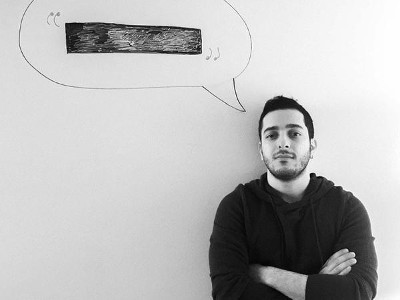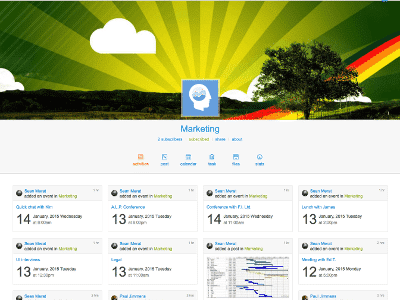

Witkit, a Vancouver-based end-to-end encrypted workplace collaboration platform, has announced that it now has 63,000 users, with a relatively high 73% active user rate. Witkit plans to come out of beta in the fall, after closing a round of financing that it’s currently negotiating.
Even with widespread regional traction in Europe and the United States, Witkit’s apparent growth is a surprise to the many skeptics who would point to the massive market head start enjoyed by that other workplace collaboration tool, Stewart Butterfield’s Slack, also based in Vancouver.
“We had a lot of non-believers out there,” says Merat. With no marketing budget, Witkit has managed to ratchet up its user base while improving its platform. But Merat sees a day, a few months from now, when expanding his team will be necessary to cope with the next level of demand.
“We will need to scale the company very rapidly,” said Merat. “When we offer paid services, when we offer our 2.0 product, we want it to be super stable and to provide the best product and service that we can.”
Aside from seeing an increase in Witkit’s user base, Merat is also keen to point out several of the platform’s new features, such as WitCrypt Stamp, which puts a stamp on the user interface, telling the user whether their actual interface has been altered.
WitCrypt, the platform’s underlying encryption function, can be used apart from Witkit, to encrypt email, for example.
With a funding round pending, Merat knows that money can be the least of a company’s worries. “It’s not just the money, as you know,” says Merat. “Once you have the money, your problems just start.”
If anyone can relate to the idea that money can create more problems than it solves, it’s probably Stewart Butterfield, who has seen his workplace collaboration tool valued in ways that even he admits are absurd.
Whether there is room for two workplace collaboration tools remains to be seen. Listening to Sean Merat talk about his product, one is reminded of the format wars in previous decades that saw irrational forces defeat the rational each and every time. Anyone could see in the early 1980s that Beta was technically superior to VHS. And yet VHS carried the day (until DVDs came along). Moral of the story? Nobody said the world was fair.
Witkit CEO Sean Merat talked to Cantech Letter recently by phone.
Where is Witkit today in terms of traction?
After launching beta, we pitched it to a handful of companies, less than a dozen. And within three months, our user base grew to where it is today, just over 63,000 users at a very high activity rate. We’ve gained traction all over the world, the United States, a lot of European countries, we have huge traction in Scandinavian countries, without ever having to have pitched any of those companies, which is interesting.
I wonder if the Scandinavian traction has anything to do with the northern European attitude towards privacy.
It is, and it’s from both sides of the spectrum. You have countries like Germany, and on the other side of the spectrum you have the United Kingdom, where people like David Cameron are pushing to outlaw encryption. But in the U.K., Witkit is also huge because people don’t like that idea. We see a lot of traction because people want to secure their information.
What kind of companies are you seeing uptake with?
As far as size, the original demographic that we targeted was small-to-medium, and that’s where we see traction. We haven’t targeted specific verticals yet. But we see a lot of law firms starting to use Witkit with their clients. We got in touch with a few of them. They all mentioned that they’re using Dropbox and it’s a nightmare. A lot of them have to tell their clients not to use email. A few of them are using a weird mechanism where their clients log in, like an in-house solution, that basically none of them like. So a lot of them have adopted Witkit and it’s working out great for them. It’s completely secure. They just have to put documents in a kit, invite their clients, and through signature verification they can edit files, they can collaborate, they can discuss terms, and they don’t have to worry about it getting leaked. Other verticals, like health care, will take more time. We’re going to concentrate on smaller verticals before we get into governments and the public sector.
“In our office, most people would agree that Slack is … not really a platform. It’s a glorified chat application, with some integration with other applications and platforms. Realistically, companies don’t just chat.” – Witkit CEO Sean Merat
You just mentioned that your users have a high level of engagement. That’s a particular problem with software makers, is not only the number of people who have downloaded the software but also how engaged they remain with it over time.
Our level of engagement is higher than our competitors. Part of the reason is that it’s centralized. In our office, most people would agree that Slack is an application. It’s not really a platform. It’s a glorified chat application, with some integration with other applications and platforms. Realistically, companies don’t just chat. They are constantly sending files around, and they aren’t just working within their team. If you consider any company, they are going to collaborate within their team, sure, but they are also going to collaborate with their lawyers, they’re going to collaborate with their PR, they’re going to communicate with their customers, they’re going to deal with all sorts of different things. They’re going to set up all kinds of calendar events, share all sorts of files, and all these things that Slack doesn’t do. So to me, a lot of the engagement is distributed. If I want to share a file, I just do it directly in Dropbox. I don’t need to necessarily go through Slack. A lot of our clients aren’t happy and have jumped ship from Slack. That’s very important to us, and we ask, “Why did you do that?” This is a recurring event. It’s not centralized. When they share a file in Dropbox, through Slack, there is a footprint of the file on Dropbox and now there’s one on Slack’s server, there’s one on Amazon AWS, and it creates a much higher potential of those files being leaked. But to answer your question, our engagement is high because we have centralized everything. For storage, for communication, within your team, outside your team, other organizations and contacts, it’s all done on Witkit. So really, if you’re really using Witkit like most of our users, you’re not scrambling between different applications. You’re only using Witkit.
So that’s the issue, is that with Slack you’re using the platform in concert with a bunch of third party applications, whereas with Witkit, it’s end-to-end encrypted and centralized.
And that’s the future. Last time we talked, Slack hadn’t been hacked yet, but I said that it’s a matter of time. And then they were breached. With these breaches, you really don’t know the effect of it until some time after, six months, one year later. You may see some devastating side effects.
Slack claimed that their breach wasn’t that serious and Stewart Butterfield told Cantech Letter, “Slack is the same as every widespread email system, your medical records, all the information that government stores about you, all your banking and financial information, everything in Facebook, Twitter, etc.”
I don’t like the way he handled that situation. He kind of said there was a trade-off for absolute security.* At Witkit, we don’t think that. We think there is no trade-off for security. Security should be straightforward and it should be the number one priority.
*(Reached for comment by Cantech Letter in March, Butterfield replied, “There are practical tradeoffs (e.g., the ability to search remote data) that people make which trade off against perfect security.”)
Leave a Reply
You must be logged in to post a comment.







 Share
Share Tweet
Tweet Share
Share




Comment